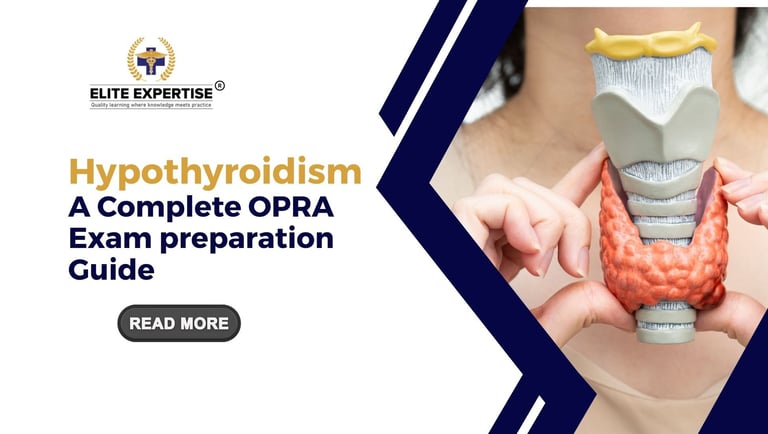ASK MY PHARMACIST | GOT QUESTIONS? Your pharmacist has answers. Click Here
Hypothyroidism: A Complete OPRA Exam preparation Guide
Learn about hypothyroidism – causes, symptoms, investigations, and treatment which is crucial for OPRA exam preparation for overseas pharmacists,Includes key points, tables, and FAQs.
Krupa
9/22/20252 min read


Key concepts:
Under active thyroid gland will not be able to produce enough thyroid hormone, which is known as hypothyroidism
There are several causes for hypothyroidism
Most common cause of hypothyroidism is Hashimoto’s thyroiditis
Diagnosis of hypothyroidism is done through high TSH blood value and low Free T4 level
Treatment for hypothyroidism is with Levothyroxine
Pharmacists play a vital role in patient education and medication adherence
OPRA exam is the test conducted to assess the international pharmacists who wish to practice in Australia. It evaluates the readiness of pharmacists to practice in Australia with safety and effectiveness.
Hypothyroidism is one of the most common diseases seen in women globally. Due to this, in the Overseas Pharmacist Readiness Assessment exam, questions about hypothyroidism are asked very often.hypothyroidism is commonly caused due to the under production of thyroid hormones (T3 and T4) by the thyroid gland.
Lets understand causes, diagnosis, and treatment which is essential for pharmacists to manage patients effectively. This guide will provide details about hypothyroidism in a structured way for the OPRA exam preparation.
What is Hypothyroidism?
This condition is caused due to the thyroid gland not producing enough thyroid hormone. Deficiency of thyroid hormones can disrupt heart rate, body temperature and all aspects of metabolism. Hypothyroidism is the most common disease in older women.
What are the Risk Factors of Hypothyroidism?
Especially in Female who are 50 years old
There is a history of thyroid disease in family
Presence of autoimmune disease (e.g., Type 1 diabetes)
History of thyroid surgery or radioiodine therapy
There is a deficiency of Iodine deficiency
Clinical features of Hypothyroidism?
Diagnosis of Hypothyroidism?
Complications of Untreated Hypothyroidism
Myxedema coma (life-threatening)
Infertility
Goiter
Cardiovascular complications (hyperlipidemia, atherosclerosis)
Management and Treatment of Hypothyroidism
1. Treatment with medication
Levothyroxine is the treatment of choice.
Initial dose of levothyroxine is:1.6 mcg/kg/day (adjusted per TSH).
start with a lower dose for elderly or cardiac patients
2. How to Monitor
TSH levels every 6-8 weeks until stable
Once stable: check TSH every 6-12 months
3. Patient Counseling
Levothyroxine should be taken on empty stomach (30–60 min before breakfast)
Avoid taking calcium/iron supplements within 4 hours of levothyroxine
therapy is usually required for lifelong
What is the Pharmacist’s Role?
Pharmacists should educate patients about the compliance and correct timing to take the levothyroxine, a common medicine for hypothyroidism
They should advocate patients with drug interaction and adverse drug reactions (e.g., PPIs, antacids, warfarin)
Pharmacists are responsible to monitor for symptoms
Conclusion
Hypothyroidism is a common disorder that is seen in females more. Pharmacists must have knowledge about these common diseases who are preparing for competitive exams like OPRA. Strategic preparation of the OPRA exam must focus on causes, clinical features, lab findings, and levothyroxine therapy. Pharmacists play a significant role in ensuring proper counseling, and follow-up to prevent complications like myxedema coma.


About the Author
Krupa Karamchand
Content Writer | Elite Expertise
Krupa Karamchand is a B. Pharm graduate and KAPS-qualified pharmacist with over 7 years of experience in the pharmaceutical field. As an experienced SEO content writer, she combines her in-depth healthcare knowledge with proven digital strategies to create informative, engaging, and search engine–optimized blogs. Krupa is passionate about making complex medical topics easy to understand and accessible to all readers.
Follow On
Follow Us
+91 76750 84909
Privacy Policy | © 2025 Elite Expertise . All Rights Reserved.
ELITE EXPERTISE PTY. LTD (ABN: 15668292439) (ACN: 668292439)
Australian Statutory Education License: OPP 2025 ELITE EXPERTISE PTY. LTD
Disclaimer
Elite Expertise is an online education platform dedicated solely to providing coaching and preparation services for the OPRA, PEBC, PSI and PTE exams. We do not offer any sponsorship or migration services. All information provided on our platform is for educational purposes only and should not be interpreted as legal or immigration advice. For inquiries regarding sponsorship, visa applications, or migration services, please consult with licensed immigration professionals or relevant authorities.
Elite Expertise is a trusted and results-driven training platform specializing in preparation for international pharmacist licensing exams. Our comprehensive courses, expert instructors, and proven methodologies have helped countless pharmacy professionals achieve their goals and succeed in competitive regulatory exams. We are proud of our strong success rate and commitment to excellence.
Elite Expertise is an independent training provider. We are not affiliated with any global pharmacy regulatory authorities or official exam-conducting bodies.
Copyright © 2026 Elite Expertise. All rights reserved.
Address
Unit 1/73 Beverley St, Doncaster East VIC 3109, Australia
